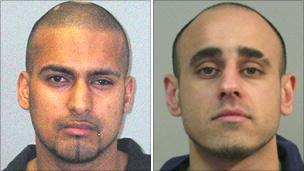Is sex abuse grooming a growing problem in the UK?
- Published

Abid Siddique, 28, and Mohammed Liaqat, 27, were convicted of rape and sexual activity with a child
"This is going on in every town and city in the UK."
The words of Martin Narey, chief executive of Barnardo's, which runs a number of projects working with hundreds of sexually abused teenaged girls.
Child sexual exploitation by older men who groom them - not on the internet, but on the street - is finally getting widespread public attention.
The Derby case, which saw the ringleaders of a gang which groomed and abused teenage girls in Derby given indeterminate jail terms, has provided shocking evidence of the persistence of some abusers.
Abid Siddique, 28, and Mohammed Liaqat, 27, led a gang that cruised the streets of Derby - looking for, the judge said "sex at any price" - with young teenagers. He described Siddique in particular as a "sexual predator, with a voracious sexual appetite".
Siddique was given an 11-year sentence, with a requirement he serve all of it before being considered for release.
Liaqat was sentenced to eight years on the same terms.
Their victims were offered drink, drugs and lifts to parties.
Once they seemed friendly with the men, they were raped or sexually assaulted - sometimes kept prisoner, sometimes thrown onto the street after the abuse.
Derby was typical of a pattern of exploitation being tracked by police and experts around Britain.
The girls tended to be 16 or younger. Often they were from challenging backgrounds - homes with inconsistent parenting, or with a history of alcohol or drug problems.
And there is one controversial factor that many of the experts in the field are often not happy to discuss freely. The race of the abusers.
The string of convictions in cities such as Rotherham, Preston, Blackburn, Rochdale and now Derby have more often than not involved Asian men, specifically men of Pakistani origin, and mainly Muslim.
In this case the judge said the race of the victims and their abusers was "coincidental", but there are concerns within Asian communities about the problem.
'Fewer morals'
Mohammed Shafiq, chief executive of the Ramadhan Foundation, a Muslim youth organisation, became the first community leader to speak out in a BBC interview two years ago.
He is not afraid of raising the issue.
"Although there have been some cases of white men being involved in this sexual exploitation of young girls, most of the perpetrators are Muslim.
"There are some Muslims who think that as long as these sex gangs aren't targeting their own sisters and daughters the issue doesn't affect them... but the vast majority of Muslims find these actions abhorrent and disgusting," he said.
He stresses these are not religiously-motivated offences but crimes carried out by men for "their own depraved sexual gratification".
"These people think that white girls have fewer morals and are less valuable than our girls."
Another commentator, Manzoor Moghul, chairman of the Muslim Forum, agrees.
"Offenders are under the misapprehension white girls are easy prey. The way they dress, their culture, makes them easy pickings," he said.
But other experts in the field believe it is wrong to suggest that child sexual exploitation is solely perpetrated by Asian men against white girls.
Sheila Taylor runs Safe and Sound Derby, a group that was instrumental in persuading girls to give evidence against Siddique and Liaqat.
Gang incentive
"This model of street-grooming is going on in many places. It is just that the recent spate of prosecutions against Asian men in the north of England and Midlands makes it look like it is concentrated in these communities," she said.
She believes some exploitation cases are harder than others to investigate, and is particularly concerned about the sexual abuse of young boys by older gangs of varied races.
Boys are simply less likely to talk about being raped, she says.
Barnardo's workers in London have also told the BBC about girls they have worked with who were abused by street gangs in the capital.
In some cases the grooming involved offering young people the chance to join a gang, in return for their participation in group rapes.
All of those working on the problem say it is important to remember the victims are too young to be able to legally consent to sex. Even if they do not say no to their abuser, it is still rape.
There is a growing feeling this is a problem that needs more vigorous attention from the government.
Derby Safeguarding Children Board has told the BBC it will formally request the Home Office carry out research into the backgrounds of those involved in sexual exploitation.
The Home Office said: "We are working to ensure local police and children's services are well placed to respond to child sexual exploitation, including supporting dedicated child abuse teams and specialist officers in every police (force)."
- Published7 January 2011
- Published25 November 2010
- Published24 November 2010
- Published24 November 2010
- Published24 November 2010
- Published24 November 2010